70 years ago today, Queen Elizabeth II was coronated in one of the first major international events to be televised. Twenty-seven million people across Britain watched the event live on the BBC Television Service, many having purchased or rented television sets specifically for that purpose. There had been considerable debate within the British Cabinet on the subject, with Prime Minister Winston Churchill against the idea; Elizabeth refused his advice on this matter and insisted the event take place before television cameras. This was the first live broadcast of an event taking place in the United Kingdom broadcast in France, Belgium, West Germany, Denmark, and the Netherlands, marking the birth of Eurovision. READ more about this historic day… (1953)
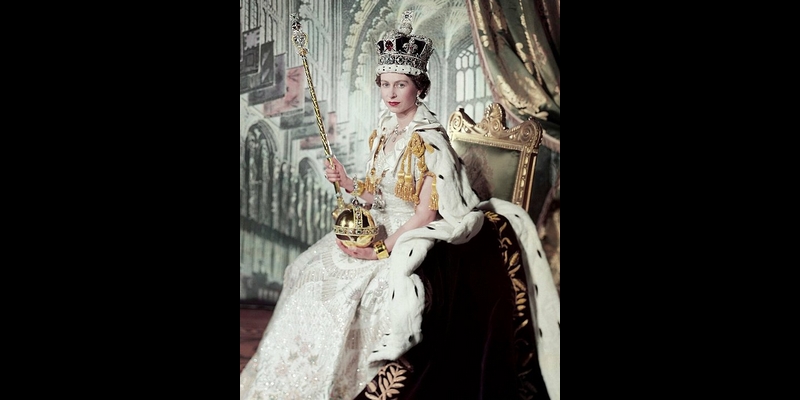 Elizabeth II on coronation day pub domain
Elizabeth II on coronation day pub domainWith Elizabeth having recently passed away, the UK and the world saw with what esteem humanity held her. While the idea of a monarch or an empire being mostly abhorred by political theorists of nearly every degree during her life, colored as it was by the independence of dozens of former colonies, other scholars have suggested that having the head of state separate from any kind of real decision making allows for citizens of a nation to have their icon of leadership free from the difficulties of politics to portray what the idea of a national leader should be—i.e. something like a noble representation of the character of a nation's people.
It's doubtful that any monarch will ever have the kind of adoration and respect that Elizabeth II received from those near to and far from the British Isles, and now most of the former dominion countries are removing the Crown as their official head of state, such as Jamaica, Australia, and Canada, for that reason.
READ More Good News on this Day in History:
On this day 77 years ago, the Italian Republic was born out of the monarchy of King Umberto II. The day is celebrated as “Festa della Republica” and is one of the biggest holidays on the Italian calendar. It's celebrated under the late-Spring sunshine with parades, concerts, and merrymaking of all sorts, with one of several iconic dishes being a spit-roasted maialino or young pig. READ exactly how the republic was formed… (1946)
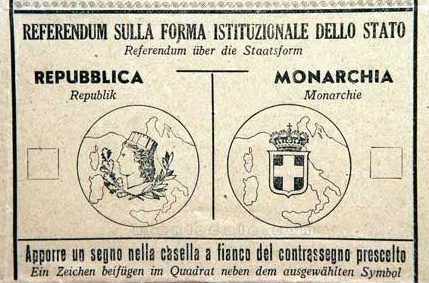
In 1946 a referendum was presented to the Italian people with as simple a resolution as possible: “Republic, or monarchy?” The question had been on the national conscience since the rise and fall of Mussolini. His end allowed the House of Savoy, the traditional monarchic rulers of Italy during periods when parts of the peninsula were united, to return to power.
The referendum didn't have much between it, with a 54%-46% split, with northern Italy decidedly voting for a republic and central and southern Italy, Sicily, and Sardinia voting decidedly for a monarchy.
After the results came in, ministers urged King Umberto to move to Naples and proclaim a rival government with the intention of fighting a civil war, knowing the army would side with the wealthier faction. However, Umberto, angry as he was, could not do such a thing, saying “My house united Italy. It will not divide it.”
And on this day in 1967, The Beatles released Sgt. Pepper's Lonely Hearts Club Band in America—widely regarded as one of the greatest albums of all time.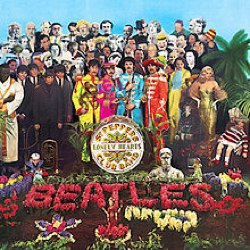
In the next four decades, it sold more than 32 million copies worldwide, making it one of the best-selling LPs in history. Their eighth studio album, it was lauded for its innovations in music production, songwriting, and graphic design; for pioneering the idea of a concept album; and for providing a musical representation of youth counterculture during the 1967 Summer of Love—it was #1 on the charts for the entire summer.
Knowing they would not need to perform the tracks live (having recently quit touring), The Fab Four pushed beyond the technological progression achieved with their 1966 album Revolver. They adopted an experimental approach to composition and recording on songs such as “With a Little Help from My Friends”, “Lucy in the Sky with Diamonds” and “A Day in the Life”.
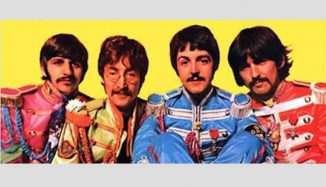 Album Art, inside the cover
Album Art, inside the coverRecorded over a 129-day period, producer George Martin and engineer Geoff Emerick’s innovative work on the album included the liberal application of sound shaping signal processing and the use of a 40-piece orchestra performing aleatoric crescendos. The album also incorporated a range of stylistic influences, including vaudeville, circus, avant-garde, and Western and Indian music, which offered sounds and textures not usually associated with popular music.
It was Paul’s idea to build the album around alter egos. Martin explains, “Paul said, ‘Why don't we make the album as though the Pepper band really existed, as though Sergeant Pepper was making the record? We'll dub in effects and things.’ I loved the idea, and from that moment on it was as though Pepper had a life of its own.”
Critics hailed it immediately as a cultural turning point that elevated pop music to the level of fine art. The New York Times Book Review characterized it as a harbinger of a “golden Renaissance of Song”. It won four Grammy Awards, including Album of the Year–the first rock LP to receive the honor. (1967)
127 years ago today, the Italian electrical engineer and inventor Guglielmo Marconi, applied for the first-ever patent for a system of wireless communication. He is credited as the inventor of radio, and shared the 1909 Nobel Prize in Physics for contributions to the development of wireless telegraphy.
At age 20, Guglielmo began experimenting with a method to transmit and receive messages over a distance without wires at the family home—first, across the room, then down the corridor, then into the fields. A breakthrough came when Marconi discovered that a much greater range could be achieved by raising the height of his antenna and grounding his instruments—the system was capable of transmitting signals up to 2 miles (3.2 km), even over hills.
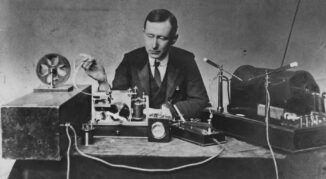
When Italian officials ignored his letter and instead evoked an insane asylum, Marconi left his birthplace of Bologna to go to England where he found the funds and support to convert his work into practical use. He became an entrepreneur, founding The Wireless Telegraph & Signal Company to innovate further.
His ‘Marconi's Law’ is the empirical relation between the length of antennas and the maximum signaling distance of radio transmissions, but with over 800 patents, he moved into radar and shortwaves, and visual wave amplification too, as one of the founders of the BBC. Upon Marconi’s death in 1937, all the radio stations around the world kept 2 mins of silence.
WATCH a great bio about his equipment helping to save hundreds of people on the Titanic… (1896)
 Photo by Siebbi, CC
Photo by Siebbi, CC82 years ago today, Charlie Watts, the drummer for the Rolling Stones was born. Originally trained as a graphic artist, and self-taught on drums, he joined the band and doubled as designer of their record covers and tour stages. An aficionado of jazz, he tours with his own group, the Charlie Watts Quintet, and appears at London’s prestigious jazz club Ronnie Scott’s. (1941)
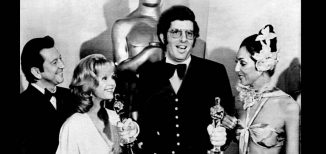 Marvin Hamlisch wins 3 Oscars in 1974 (with Debbi Reynolds and Cher)
Marvin Hamlisch wins 3 Oscars in 1974 (with Debbi Reynolds and Cher)And, 79 years ago today, composer Marvin Hamlisch, who is one of only two people to have ever won the Emmy, Grammy, Oscar and Tony awards, along with a Pulitzer Prize, was born. The New York pianist wrote some of the best-loved and most enduring songs and scores in movie history, including the awarding winning songs The Way We Were, The Entertainer (from The Sting), and Nobody Does it Better (from The Spy Who Loved Me). Hamlisch was also the primary conductor for the Pittsburgh Pops from 1995 until his 2012 death. (1944)
Happy 67th Birthday to comedian and screenwriter Dana Carvey. The SNL alum from Montana brought to life Garth on Wayne’s World, and became renowned for his impressions of George Bush, Al Pacino, Paul McCartney, and many more. For his work as a cast member on Saturday Night Live from 1986 to 1993, he earned Emmy nominations five consecutive years, with a win the final year.
His breakout character was the smug and pious ‘Church Lady’, which Carvey said was based on a woman he knew from church while growing up, who would keep track of other churchgoers’ attendance. WATCH him play Wheel of Impressions on the Tonight Show… (1955)
SHARE the Milestones, Memories, and Music…
Source link

